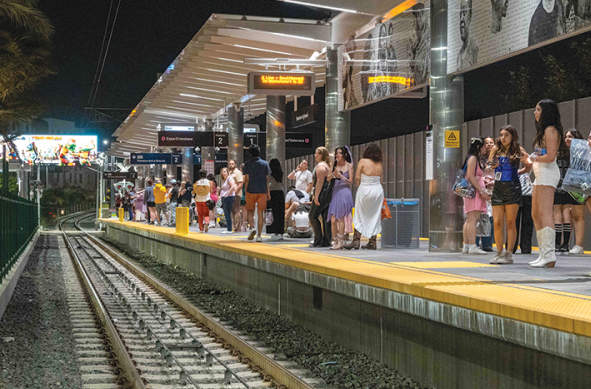LA Metro: Taylor Swift, Hard Summer Fans Set New Ridership Records 
The Los Angeles County Metropolitan Transportation Authority (Metro) announced today that the agency experienced over 150,000 additional Metro Rail boardings during Taylor Swift’s six-night concert tour in Los Angeles representing a nearly 25 percent increase in Metro Rail system ridership over same day averages in July 2023, shattering post-pandemic ridership records, with the previous record set during the Regional Connector opening earlier this year. In addition, special event shuttle bus service carried over 30,000 additional boardings bringing the rail and bus total to over 180,000 boardings carried over the concert series.
Metro saw ridership grow each night of Swift’s concert dates. As Swiftie excitement built night after night, so did Metro ridership.
“We are thrilled ‘Swifties’ and Hard Summer festivalgoers chose to take Metro to fuel their passion for music,” said Metro CEO Stephanie Wiggins. “Introducing young people to the benefits of using public transit is a priority for Metro. Also a priority: building our capability to provide service to large-scale entertainment and sports events across the region, particularly as we see the strong growth in Metro’s weekend ridership.”
Average weekend ridership is now at 91 percent of pre-pandemic level and 76 percent for average weekdays.
“We will continue to focus on learning about our customers and their needs – no matter when they ride – and improve their experience so it exceeds their expectations for convenience, reliability, safety, and cleanliness. It’s the only way we can become Angelenos’ first choice in transportation,” Wiggins added.
Concertgoers followed Metro’s social media pages for the latest updates on service and all that was happening around the fun and excitement. And they shared their thoughts about the service.
Metro Ambassadors and staff were positioned at stations on the system to help new riders purchase tickets and navigate the rail system and shuttle buses. Metro staff joined the excitement and fun and sang along with riders on platforms and buses, exchanged friendship bracelets, and took selfies with fans at our station take-over signs “Taylor Nation Station” on the C Line and Speak Now/Taylor’s Station on the K Line. The 6-nights of Taylor mania proved to be an exceptional experience for fans and Metro staff alike.
SunLine Transit Agency Welcomes Mona Babauta as New CEO
Mona Babauta is being welcomed at SunLine Transit Agency's new CEO/General Manager. The seasoned transit professional comes to the agency following 26 years of public service in California – 24 of which have been in the public transit industry serving communities in the Los Angeles and San Francisco Bay areas.
“We are so pleased to be welcoming Mona to the helm of SunLine Transit Agency today,” said Lisa Middleton, Board Chair of SunLine Transit Agency. “Our Board is impressed by the leadership qualities and experience she brings to SunLine, and we have the utmost confidence she is the ideal individual to lead SunLine as we continue to deliver safe, reliable transit services to our community utilizing our clean fuels fleet.”
Babauta has served as the Deputy General Manager for Golden Gate Transit, which is a division of the Golden Gate Bridge, Highway and Transportation District that provides transit service in Sonoma, Marin, Contra Costa and San Francisco counties.
Separate from Babauta’s expansive professional career, she has also been active in various state, regional and national committees focused on transit advocacy and sustainability, including serving on the Executive Committee of the California Transit Association and the Board of Directors of The Center for Transportation and the Environment.
“I am both thrilled and honored to be joining SunLine’s team today, as I have admired the agency’s innovative spirit and industry leadership in the hydrogen fuel cell space for many years,” said Babauta. “I look forward to working with the Board, the staff and its labor partners, as well as our community stakeholders, to advance projects and programs that will further improve the customer experience and mobility throughout the Coachella Valley.”
VTA Sees Steady Ridership Increases
2023 Silicon Valley Bus and Light Rail Ridership is up 25% Over 2022
VTA's transit ridership recovery since the COVID pandemic is among the highest in the nation, including a 25% overall year to-date increase from 2022 to 2023. As VTA ridership hovers around 72% of pre-pandemic numbers, there is increasing confidence that VTA’s BART Silicon Valley Phase II Extension project will be a further boon to transit ridership.
The recent special two-day event service to the Taylor Swift Eras Concert resulted in over 45,000 trips, the highest event ridership on record to and from Levi's Stadium since its 2014 opening. Public transit use is increasing substantially for essential service workers and non-commute trips despite the growth of remote work options. This, in turn, bodes well for transit options like continuing the 16-mile BART extension further into San Jose and Santa Clara.
“The sacrifice we make today to ensure this historic infrastructure upgrade is a gift to future generations,” said San Jose Mayor Matt Mahan, who also serves on VTA’s Board of Directors. “Silicon Valley’s future growth, quality of life and climate resilience depends upon better transportation infrastructure, including BART’s extension to San Jose.”
In addition, with students of all ages returning full-time to classrooms, tailoring service to meet school schedules is a key consideration of VTA's overall service plan. For local student commuters, from grade school through graduate school, VTA bus and light rail provide a safe, economic and environmentally conscious alternative to auto trips. Many university students, especially non-car owners throughout the Bay Area region, depend on regional rail or a combined trip with local transit to commute to school. Currently, a combination of VTA, Caltrain, and BART brings students to San Jose State, Santa Clara, and Stanford Universities, as well as brings students living in Santa Clara County to colleges and universities throughout the Bay Area region. When VTA completes the final phase of its BART Extension Program, approximately 50% of trips to and from the four new stations, a total of 32,900 by 2040, will be non-work trips.
SANDAG CEO Ikhrata to leave at end of 2023
San Diego Association of Governments (SANDAG) CEO Hasan Ikhrata has submitted his notice to the Board of Directors Aug. 1. SANDAG and San Diego County Board of Supervisors Chairwoman Nora Vargas will be leading the transition with the board to discuss next steps to fill the CEO role.
“I came to SANDAG almost five years ago to reinvigorate this organization and reimagine a brighter future for the San Diego region”, Ikhrata said. “Together, with the amazing SANDAG team, we have done just that, tackling long-standing issues such as transit to the airport, the falling Del Mar Bluffs, building a third crossing at the U.S.-Mexico border and the need for free transit, more bikeways and housing. Our bold vision has garnered support from federal and state funding agencies, with more than $1 billion in investments coming to the region. As the agency starts its next chapter, this is the right time to hand over the leadership reins.”
Under Ikhrata’s leadership, more than $1 billion in funds were awarded for projects throughout the San Diego region and major progress was made on several, key regional priorities.
“This news is a bittersweet moment for our region,” Vargas said. “I am grateful for Hasan's vision, leadership and unwavering commitment to helping us all reimagine the future of the San Diego region. Throughout his tenure, Hasan has spearheaded transformative changes in transportation and regional planning for the county of San Diego, and I want to wish him the best in his next endeavor. I also want to thank SANDAG staff for all the work they continue to do, and I look forward to continuing to deliver on all of our projects and priorities for the San Diego region.”
Ikhrata will serve in his position until his last day with the agency, December 29.
BART PD's Progressive Policing Bureau wins prestigious national award for innovation
The BART Police Department’s Progressive Policing and Community Engagement Bureau has won the American Public Transportation Association’s national Innovation Award. The Progressive Policing and Community Engagement Bureau (PPCEB) has established itself as a national model by increasing BART’s safety presence while ensuring the system is welcoming to all members of the community. The PPCEB is a trail blazing part of the effort to ensure BART is the safest way to travel across the Bay Area.
“The members of the Progressive Policing and Community Engagement Bureau are force multipliers for rider safety,” said BART PD interim Chief Kevin Franklin. “The bureau has become a national model with both transit and traditional law enforcement agencies reaching out to us to learn more about the innovative steps we’re taking to boost safety for our riders.”
The numbers show how the PPCEB is boosting rider safety. In the first six months of this year members of the PPCEB performed more than 10,700 welfare checks on people in the BART system who appeared to need help. There were more than 2,500 instances when PPCEB members intervened when they saw violations of BART’s Code of Conduct. In the past those violations would have required a response by a sworn officer. Instead, members of the PPCEB can offer a more appropriate response with unarmed, specially trained BART PD staff. That has freed up sworn officers to respond more quickly to urgent emergency calls. BART PD has one of the fastest response times for tier 1 emergency calls at an average of just more than 4 minutes.
The PPCEB is primarily composed of non-sworn Transit Ambassadors and Crisis Intervention Specialists. These unarmed employees of BART PD receive specialized training in de-escalation techniques. Transit Ambassadors walk dozens of trains and platforms each day. They’re equipped with radios to report safety concerns. They observe, report, and call upon traditional sworn officers when enforcement is needed. Crisis Intervention Specialists have backgrounds in social work and specialize in connecting people at risk with potentially lifesaving services.
The PPCEB was launched in 2020. It was the first of its kind for a transit agency in the U.S. The BART PD model stands out because members of the PPCEB are full-time BART PD employees as opposed to contractors that many other systems rely on. The bureau builds on a history of more than a decade of reform efforts aimed at elevating equitable policing at BART.